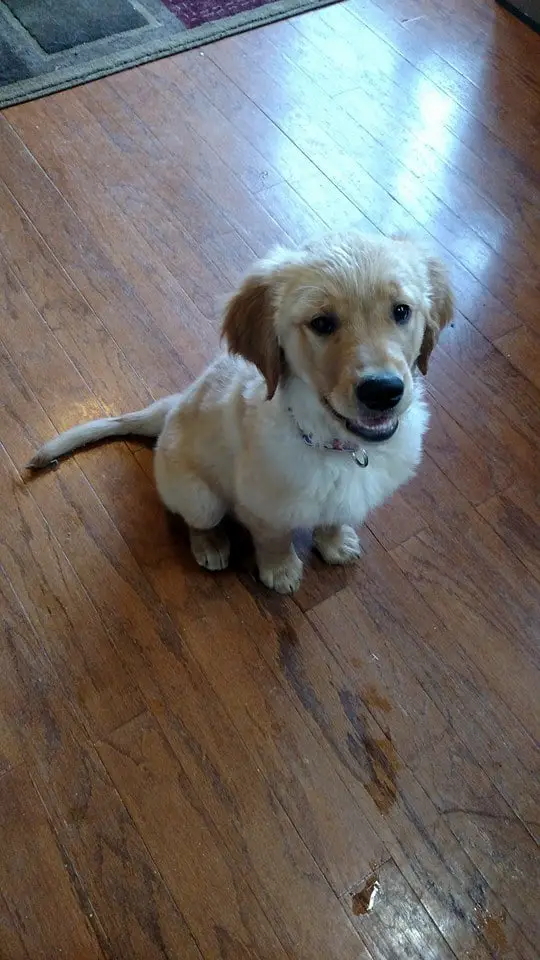Does My Dog Have A UTI? What Else Could It Be?
Urinary Tract Infections (UTIs) are one of the more common issues I deal with daily in my veterinary practice. It’s also one of the most common topics of discussion with every dog owner at least once in their dog’s life.
Table of Contents
What Are The Symptoms Of A UTI?
Dogs that have UTIs often display signs of pain when they pass urine. They may regress from good housetraining by leaking and dribbling indoors. If they relieve themselves against a light-colored surface (like your carpet), their urine may be pinkish with traces of blood.
It’s a good idea to take your dog to the vet when you see one or more of these early warning signals of a UTI:
- Breaking housetraining.
- Straining to urinate.
- Trying to urinate all the time.
- Howling or moaning in pain during urination.
- Accidents around the house.
- Passing cloudy urine.
- Passing pinkish urine.
- Frequently licking genitals.
- Urine with a sulfurous bad smell.
Signs that a UTI needs emergency treatment include any of the above combined with:
- Fever.
- Vomiting.
- Loss of appetite.
- Lethargy, loss of interest in play, hiding from the rest of the family.
- Tenderness around the genitals.
What Causes A UTI In A Dog?
Veterinary researchers tell us that about half of cases of canine UTI are caused by E. coli. These are the kind of bacteria most common in feces. At some point, your dog has made contact with its urethra into a pile of poop that contained the E.coli that caused its UTI.
Got a dog that’s a low squatter and has occasional UTIs? That’s probably the culprit. You’re going to want to make sure your dog urinates in as clean an area as possible. Urinating over gravel may be a better idea than grass/mud.
Other Things That Can Predispose a Dog To A UTI:
- Not drinking enough
- Holding urine for too long
- Having other illnesses: Diabetes, Cushings
- Congenital anatomical issues preventing normal bladder emptying
- Bladder stones (although in many cases the infection comes first and then the stones…but in my experience we usually diagnose the infection prior to realizing that there are stones there)
How Does The Veterinarian Diagnose A UTI?
A urinalysis needs to be done with a sample of your dog’s urine. Sometimes your vet will perform the test in-house, but in my practice we tend to send out many of our urine tests.
What If It’s Not A UTI?
The list of possibilities is so long that my fingers would fall off before I can tell you all the other things I’ve diagnosed dogs with instead of a UTI. If you have a dog that exhibits one more of the above symptoms of typical UTIs, it could be one of these conditions:
Puppy Age
Puppies don’t normally get urinary tract infections despite how messy they can be. Most of the time when I’ve seen symptoms of a UTI in a puppy it was puppy vaginitis or just poor house training (that’s my Golden Puppy below; she was very stubborn). Also some puppy breeds (think Retrievers) drink lots of water by nature and will urinate a great deal as a result.

Young Adult (1-4 Years Old)
If it’s not an infection, then the other possibilities include:
- Infection or Inflammation around the vulva or penis area (common in dogs like Bulldogs)
- In Heat (if the dog is still intact)
- Poor House Training
- Anxiety
Later Adult (5-8 years)
- Cushings Disease
- Diabetes Mellitus
- Kidney Disease
- Infection or Inflammation around the vulva or penis area
- Anxiety
- Urinary Incontinence
Senior (Older than 8 years for medium and larger dogs)
- Kidney Disease
- Diabetes
- Cushing’s Disease
- Bladder Stones
- Infection or Inflammation around the vulva or penis area
- Urinary Incontinence
Geriatric (Older than 12 years in small breed dogs)
- Kidney Disease
- Diabetes
- Cushing’s Disease
- Bladder Stones
- Infection or Inflammation around the vulva or penis area
- Urinary Incontinence
- Cognitive Dysfunction (your dog doesn’t realize it’s not outside)
To Conclude:
This article was written to help you understand the basics of UTI vs Not-UTI-but-looks-like-UTI. It can be frustrating for a dog owner who believes that their dog’s issue can be solved by a quick round of antibiotics and then it turns out to be much more.
Ultimately your veterinarian is your best source of info for whether or not your dog has a UTI. Don’t put off calling them. Your dog is likely uncomfortable in some way and you need to get on top of this.
